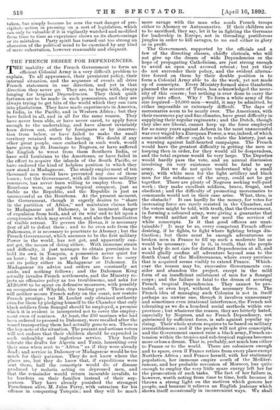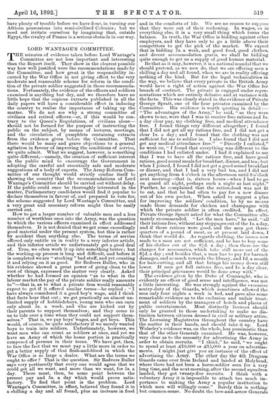THE FRENCH DESIRE FOR DEPENDENCIES.
THE inability of the French Government to form an efficient Colonial Army is a very difficult problem to explain. To all appearance, their persistent policy, their internal situation, and the sequence of events all drive French statesmen in one direction, and yet in that direction they never go. They are, to begin with, always longing for tropical Dependencies. They think quick fortunes are to be made in such possessions, and they are always trying to get bits of the world which they can turn into plantations. They have made experiments in America, in India, in the Pacific, and in Western Africa ; but they have failed in all, and in all for the same reason. They have never been able, or have never cared, to apply force enough to the undertaking, and have almost invariably been driven out, either by foreigners or by insurrec- tion from below, or have failed to make the small territory retained worth the having. We doubt if any other great people, once embarked in such work, would have given up St. Domingo to Negroes, or have suffered the English to wrest from them Southern India, or have sold Louisiana to the Americans, or have failed in the effort to acquire the islands of the South Pacific, or have endured the kind of helpless position in which they now stand in Madagascar. The steady employment of ten thousand men would have prevented any one of these losses ; but the Government, with all its immense military resources, has never -been willing to employ them. The Bourbons were, as regards tropical conquest, just as feeble as the Republic, and the Republic is just as unsuccessful as the Bourbons. At the present moment, the Government, though it eagerly desires to "share in the partition of Africa," and maintains claims both to Madagascar and Dahomey, is in imminent danger of expulsion from both, and at its wits' end to hit upon a compromise which may avoid war, and also the humiliation of visible retreat. To govern the Hovas, it is necessary first of all to defeat them;, and to be even safe from the Dahomans, it is necessary to penetrate to Abomey ; but the French Government, which assumes to be the first military Power in the world,. has not got, and apparently can- not get, the means of doing either. With immense strain and difficulty, it just manages to obtain permission to hold its own in Tonquin, a possession never quiet for an hour ; but it dare not ask for the force to carry out its policy either in Madagascar or Dahomey. In Madagascar its advice and orders are constantly set aside, and nothing follows ; and the Dahoman King actually invades French settlements, and the Ministry re- jects an offensive policy as too troublesome, and asks for £120,000 to be spent on defensive measures, with possibly an occupation of Whydah, the trading port. These steps will neither secure French safety on the coast, nor restore French prestige ; but M. Loubet only obtained authority even for them by pledging himself to the Chamber that only black soldiers from Senegal should be employed, a promise which it is evident is interpreted not to cover the employ- ment even of marines. At least, the 250 marines who had been ordered to proceed to Dahomey, were recalled after the vessel transporting them had actually gone to sea. There is the key-note of the'situation. The peasant and artisan voters will not endure that their children should be expended in such unhealthy and inglorious service. They hardly tolerate the drafts for Algeria and Tunis, lamenting over their sons when sent to " Africa " as if they were already dead ; and service in Dahomey or Madagascar would be too much for their patience. They do not know where the places are, but- they do know that, if expeditions were sent there, half the conscripts would die of disease produced by malaria acting on depressed men, and that the remainder would return incurable invalids, to be burdens on their families instead of their sup- porters. They have already punished the strongest Frenchman alive, M. Jules Ferry, with ostracism for his offence in conquering Tonquin ; and they will be much more savage with the man who sends French troops either to Abomey or Antananarivo. If their children are to be sacrificed, they say, let it be in fighting the Germans for leadership in Europe, not in threading pestiferous jungles in order to 1611 savages, to no end either in glory or in profit.
The Government, supported by the officials and a few of the directing classes, chiefly clericals, who will not give up the dream of wide Dependencies or the hope of propagating Catholicism, are just strong enough to avoid an open and avowed retreat ; but yet they do not surrender their policy, and the evident alterna- tive forced on them by their double position is to form a Colonial Army able to do the work, yet not made up of conscripts. Every Ministry formed since Gambetta planned the seizure of Tunis, has acknowledged the necer- say of this course ; but nothing is ever done to carry the policy into effect. Why ? To form a white army of the size required-10,000 men—would, it may be admitted, be either impossible or extremely difficult. The days of mercenaries seem to be nearly over. The Americans, with their enormous pay and fine climates, have great difficulty in supplying their regular regiments ; and the Dutch, though they also are liberal, cannot keep up the force employed for so many years against Acheen in the most unsuccessful war ever waged by a European Power, a war, indeed, of which some scientific officer ought to relate the history, just as a warning against half-hearted campaigns. The French would have the greatest difficulty in getting the men or keeping then in order, for they would all be desperadoes, and the total expense would be very large. The Deputies would hardly pass the vote, and an annual discussion involving its very existence would be fatal to any army. But we do not quite understand why a small army, with white men for the light artillery and black men for the substance of the army, could not be got together. There are plenty of Negroes seeking well-paid work ; they make excellent soldiers, brave, frugal, and obedient ; and the difficulty of promoting mercenaries to commands would not in their case arise. What, then, is the obstacle ? It can hardly be the money, for votes for increasing force are rarely resisted in the Chamber, and the voters might be told, with truth, that the Government, in forming a coloured army, were giving a guarantee that they would neither ask for nor need the services of white conscripts. Is it that good officers are unat- tainable? It may be so, every competent French officer desiring, if he fights, to fight where fighting brings dis- tinction; but there must be enough adventurous or broken men in France to fill up such a moderate list as would be necessary. Or is it, in truth, that the people as a body do not care for distant Dependencies at all, and would gladly confine all adventure beyond seas to the South Coast of the Mediterranean, where every province that is acquired seems visibly to extend France. Which- ever the reason may be, successive Governments con- sider and abandon the project, except in the mild form of an insufficient enlistment of men for a Senegal corps ; and the failure is fatal to the dream of securing French tropical Dependencies. They cannot be pro- tected, or even kept, without the necessary force. The French idea of managing such Colonies is not in itself perhaps an unwise one, though it involves unnecessary and sometimes even irrational interference, the French not tolerating as we do a hundred social methods within one province ; but whatever the reason, they are bitterly hated, especially by Negroes, and no French Dependency, not garrisoned by sufficient force, is safe against popular up- rising. Their whole system requires to be based on military irresistibleness ; and if the people will not give conscripts, and the Government cannot raise a black army, French ex- tension within the tropics and sub-tropical regions becomes more coxless a dream. That is, probably, not much loss either to France or to the world. There are colonisers enough and to spare, even if France retires from every place except Northern Africa ; and France herself, with her stationary population, her immense empire south of the Mediter- ranean, and her probable reversion of Morocco, has quite enough to employ the very little spare energy left her for the prosecution of such tasks. The fact of her failure is, however, worth noting from time to time, both because it throws a strong light on the motives which govern her people, and because it relieves an English jealousy which shows itself occasionally in inconvenient ways. We shall have plenty of trouble before we have done, in turning our African possessions into semi-civilised Colonies ; but we need not irritate ourselves by imagining that, outside Egypt, the rivalry of France is a serious obstacle in our way.

































 Previous page
Previous page